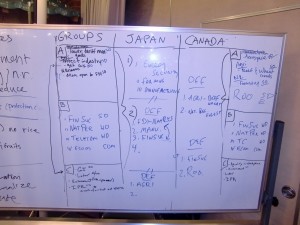Hello guys. This is Saya. (As we all japanese students use “moriken” account, I guess it would be better to state who is writing first.)
I hope everyone is doing fine.
Reflecting the memories of the program, it was definetely a great opportunity.
I was working for Labour/Environment/Development/IPR.
As Julia posted previously, our group was quite cooporative, and it allowed our articles to be creative.
Our discussion was not controversial as other teams, but I do believe that these areas are very important for both countries.
Those are global issues which both Japan and Canada have responsibilities to work for as a highly developed country.
However, the thing is when it comes to negotiation for climate change, for exmaple, it suddenly becomes a highly political issue, like which country should be included or which year sould be made a reference year.
What has been left behind is… maybe the victims currently suffered from climate change, and I think that is one of the main areas which current negotiation lacks scope.
Anyways, again it was so nice to participate in this program.
We studied a lot, met so many people from institutions, and had loads of fun!
I was so amazed how smart, active and kind the UBC students are.
I even felt sorry that we Japanese students didn’t prepare much as you did, also for my poor English skill.
But still, it was so academically-inspiring, fun experience.
I would like to say thank you for professors to make this event happen, people from institutions for giving us great advice, and Canadian students to plan this wonderful program and your friendship.
Let’s keep in touch.
















